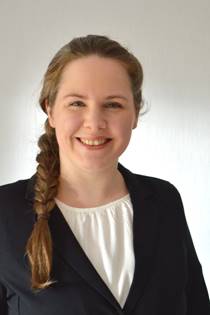Nadine Schadzek, Dr. rer. nat.

Group leader for Advanced Tissue Culture Models, biomimetic 3D models of neurodegenerative diseases, CRISPR/Cas-based gene editing, 3D bioprinting
Education
2014-2020 Doctoral thesis (Dr. rer. nat.) Institute of Cell Biology and Biophysics, Department of Biophysics, Gottfried Wilhelm Leibniz University Hannover
2011-2014 Master of Science (M.Sc.) Life Science; Gottfried Wilhelm Leibniz University Hannover
2008-2011 Bachelor of Science (B.Sc.) Life Science; Gottfried Wilhelm Leibniz University Hannover
Scientific Career
Since 2024 Group leader for Advanced Tissue Culture Models at the Institute of Neuroanatomy and Cell Biology, Hannover Medical School
2019-2024 Research scientist/postdoctoral fellow at the Institute of Cell Biology and Biophysics, Department of Cell Biology, Gottfried Wilhelm Leibniz University Hannover
2014-2019 Research scientist/PhD candidate at the Institute of Cell Biology and Biophysics, Department of Biophysics, Gottfried Wilhelm Leibniz University Hannover
2012-2014 Research Assistant at the Institute of Cell Biology and Biophysics, Department of Biophysics, Gottfried Wilhelm Leibniz University Hannover
Additional Qualifications
2024 Laboratory Animal Science (requirements comply with Annex 1 of the Animal Welfare Act, 2013, and Annex V of Directive 2010/63/EU)
2012 Gene Technology, Biosafety, and Biosecurity: Government-certified training course according to §15 GenTSV for project managers and responsible persons for biosafety
2012 Quality Management / GMP Officer: Quality, environmental, and cost management in the chemical-pharmaceutical industry
2012 Water Protection Officer, Expertise in accordance with §§64-65 of the Water Resources Act
Scientific Focus
- Advanced Tissue Culture Models: Biomimetic 3D models of neurodegenerative diseases
- Development of humanized and animal-free models in order to investigate new therapeutics for neurodegenerative diseases
- Integration of 3D bioprinting and cell type-specific CRISPR/Cas-based gene editing for the development of specific disease-related cell culture models
Online Presence
ORCID: 0000-0003-2978-1763
Publications
Analysis of connexin 43, connexin 45 and N-cadherin in the human sertoli cell line FS1 and the human seminoma-like cell line TCam-2 in comparison with human testicular biopsies. Schulz B., Schumacher V., Ngezahayo A., Maier-Begandt D., Schadzek N., Wilhelm J., Weidner W., Pilatz A., Fietz D., Kliesch S., Schnepel N., Hambruch N., Rode K., Langeheine M., Brehm R. (2023). BMC Cancer. 23(1):232. DOI: 10.1186/s12885-023-10696-7.
A parallelized, perfused 3D triculture model of leukemia for in vitro drug testing of chemotherapeutics. Zippel S., Dilger N., Chatterjee C., Raic A., Brenner-Weiß G., Schadzek P., Rapp B. E. Lee-Thedieck C. (2022). Biofabrication, 14-3, DOI: 10.1088/1758-5090/ac6a7e. (Shared first authorship)
Rebuilding the hematopoietic stem cell niche: Recent developments and future prospects. Chatterjee C., Schertl P., Frommer M., Ludwig-Husemann A., Mohra A., Dilger N., Naolou T., Meermeyer S., Bergmann T. C., Alonso Calleja A., Lee-Thedieck C. (2021). Acta Biomaterialia, 132, 129-148, DOI: 10.1016/j.actbio.2021.03.061.
Gap Junction Dependent Cell Communication Is Modulated During Transdifferentiation of Mesenchymal Stem/Stromal Cells Towards Neuron-Like Cells. Dilger N., Neehus A.-L., Grieger K., Hoffmann A., Menssen M., Ngezahayo A. (2020). Front. Cell Dev. Biol., Volume 8 – 2020, DOI: 10.3389/fcell.2020.00869.
Concatenation of human connexin26 (hCx26) and human connexin46 (hCx46) for the analysis of heteromeric gap junction hemichannels and heterotypic gap junction channels. Schadzek P., Hermes D., Stahl Y., Dilger N., Ngezahayo A. (2018). Int. J. Mol. Sci. 2018, 19, 2742, DOI: 10.3390/ijms19092742.